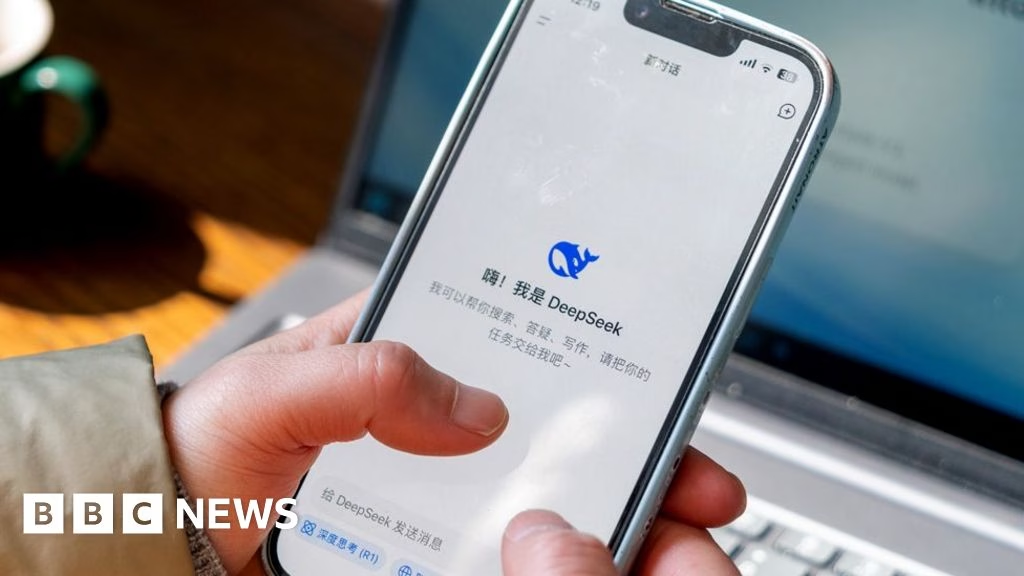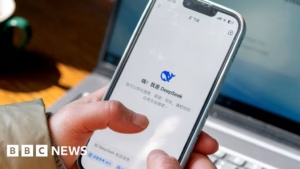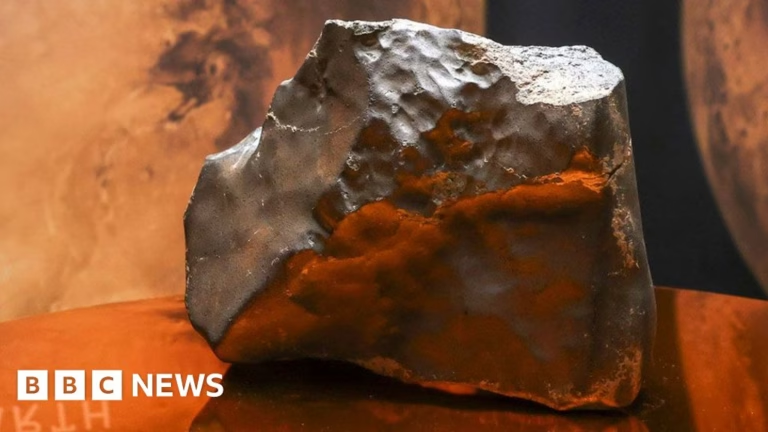San Francisco”>

The US market was taken aback, but has DeepSeek by China impacted the AI industry?
San Francisco”>
.webp)
Shutterstock
US President Donald Trump had been in office scarcely a week when a new Chinese artificial intelligence (AI) app called DeepSeek jolted Silicon Valley.
Overnight, DeepSeek-R1 shot to the top of the Apple charts as the most downloaded free app in the US.
The firm said at the time its new chatbot rivalled ChatGPT. Not only that. They asserted it had cost a mere fraction to develop.
Those claims – and the app’s sudden surge in popularity – wiped $600bn (£446bn) or 17% off the market value of chip giant Nvidia, marking the largest one-day loss for a single stock in the history of the US stock market.
Several other tech stocks with exposure to AI were caught in the downdraft, too.
DeepSeek also cast doubt on American AI dominance. Up until then, China had been seen as having fallen behind the US. Now, it seemed as though China had catapulted to the forefront.
Venture capitalist Marc Andreessen referred to the arrival of DeepSeek-R1 as “AI’s Sputnik moment,” a reference to the Soviet satellite that had kicked off the space race between the US and the USSR more than a half century earlier.
(38c36bc0-6e22-11f0af20-030418be2ca5).webp)
Bloomberg via Getty Images
Still relevant
It has now been six months since DeepSeek stunned the world.
Today, China’s breakthrough app has largely dropped out of the headlines. It’s no longer the hot topic at happy hour here in San Francisco. But DeepSeek hasn’t disappeared.
DeepSeek challenged certain key assumptions about AI that had been championed by American executives like Sam Altman, CEO of ChatGPT-maker OpenAI.
“We were on a path where bigger was considered better,” according to Sid Sheth, CEO of AI chip startup d-Matrix.
Perhaps maxing out on data centres, servers, chips, and the electricity to run it all wasn’t the way forward after all.
Despite DeepSeek ostensibly not having access to the most powerful tech available at the time, Sheth told the BBC that it showed that “with smarter engineering, you actually can build a capable model”.
The surge of interest in DeepSeek took hold over a weekend in late January, before corporate IT personnel could move to stop employees from flocking to it.
When organisations caught on the following Monday, many scrambled to ban workers from using the app as worries set in about whether user data was potentially being shared with the People’s Republic of China, where DeepSeek is based.
But while exact numbers aren’t available, plenty of Americans still use DeepSeek today.
Certain Silicon Valley start-ups have opted to stick with DeepSeek in lieu of more expensive AI models from US firms in a bid to cut down on costs.
One investor told me for cash-strapped firms, funds saved by continuing to use DeepSeek are helping to pay for critical needs such as additional headcount.
They are, however, being careful.
In online forums, users explain how to run DeepSeek-R1 on their own devices rather than online using DeepSeek’s servers in China – a workaround they believe can protect their data from being shared surreptitiously.
“It’s a good way to use the model without being concerned about what it’s exfiltrating” to China, said Christopher Caen, CEO of Mill Pond Research.
US-China rivalry
(ab33ebb0-6e24-11f0af20-030418be2ca5).webp)
CFOTO/Future Publishing via Getty Images
DeepSeek’s arrival also marked a turning point in the US-China AI rivalry, some experts say.
“China was seen as playing catch-up in large language models until this point, with competitive models but always trailing the best western ones,” policy analyst Wendy Chang of the Mercator Institute for China Studies told the BBC.
A large language model (LLM) is a reasoning system trained to predict the next word in a given sentence or phrase.
DeepSeek changed perceptions when it claimed to have achieved a leading model for a fraction of the computational resources and costs common among its American counterparts.
OpenAI had spent $5bn (£3.7bn) in 2024 alone. By contrast, DeepSeek researchers said they had developed DeepSeek-R1 – which came out on top of OpenAI’s o1 model across multiple benchmarks – for just $5.6m (£4.2m).
“DeepSeek revealed the competitiveness of China’s AI landscape to the world,” Chang said.
American AI developers have managed to capitalize on this shift.
AI-related deals and other announcements trumpeted by the Trump administration and major American tech companies are often framed as critical to staying ahead of China.
Trump’s AI czar David Sacks noted the technology would have “profound ramifications for both the economy and national security” when the administration unveiled its AI Action Plan last month.
“It’s just very important that America continues to be the dominant power in AI,” Sacks said.
DeepSeek has never managed to quell concerns over the security implications of its Chinese origins.
The US government has been assessing the company’s links to Beijing, as first reported by Reuters in June.
A senior US State Department official told the BBC they understood “DeepSeek has willingly provided, and will likely continue to provide, support to China’s military and intelligence operations”.
DeepSeek did not respond to the BBC’s request for comment but the company’s privacy policy states that its servers are located in the People’s Republic of China.
“When you access our services, your Personal Data may be processed and stored in our servers in the People’s Republic of China,” the policy says. “This may be a direct provision of your Personal Data to us or a transfer that we or a third-party make.”
(348b6bc0-6e22-11f0af20-030418be2ca5).webp)
Tech Decoded
Source: https://www.bbc.com/news/articles/c4gez754mn6o?at_medium=RSS&at_campaign=rss






-web-2.26.0-8/grey-placeholder.png)


